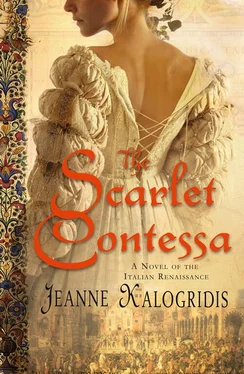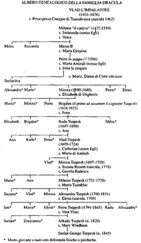“I am,” I said, blushing. I was unaccustomed to being acknowledged by anyone save Bona.
“I am an acquaintance of your husband’s,” he said. “I have known him for many years. It was I, in fact, who recommended him to the duke for employment.”
Tongue-tied in the face of his composure and charm, I had no response.
Duke Galeazzo was late, requiring Bona and Lorenzo to engage in small talk for half an hour. Galeazzo’s secretary and right-hand man, the thick-necked, burly Cicco Simonetta, arrived first. With his peasant’s hair—long on top, cropped sharply above his oddly small ears—and round, heavy face, Cicco could easily have been mistaken for an ignorant bumpkin were it not for his fine dress and the shrewdness in his eyes. The duke kept no secrets from Cicco, who greeted Lorenzo with no smile and much reticence.
After the silent appearance of three sullen, armed bodyguards, and the emergence of attendants and the ducal cupbearer from the kitchen, Galeazzo arrived—without the usual blare of trumpets, given that Lorenzo’s arrival was to be known by as few residents of Castle Pavia as possible. The duke’s pride, however, required that his entry be accompanied by the sung praises of one of the castrated tenors who had entertained us in Bona’s chamber the day before.
A month shy of his thirty-third birthday, Galeazzo Maria was in his prime. Like all the Sforza, he was sturdy, muscular, and passionately devoted to sport. His tunic, of gray-green watered silk embroidered with bronze fleur-de-lis, with white ermine trim at the collar, was tailored to show off a powerful chest and shoulders. His cap of light reddish brown hair was cut in layers, long enough to cover his ears but too short to touch his collar; as was the fashion, carefully crimped curls framed his face. The latter was dominated by a strong nose, so badly broken in his youth that the bridge had a large bump. His green eyes were deep set, round, and ringed by shadows, his lips thin and permanently pursed in an arrogant sneer.
This was the man who had ordered one of his enemies to be nailed to his coffin before being buried alive; who had, instead of showing generosity to a starving peasant who dared catch a hare in the hunting park, killed him by forcing him to swallow the unskinned animal whole; and who had, in a spasm of jealousy, chopped off the hands of a courtier who had caressed one of Galeazzo’s former lovers. The duke had been born not to heartless parents but to a brave warrior, Francesco Sforza, and a proud, strong-willed but charitable woman, Bianca Maria Visconti, daughter of the Duke of Milan. His parents were much loved, and as their eldest son grew to maturity, they were perplexed by his arrogance and cruelty. When his father died and Galeazzo claimed the duchy, he resisted his mother’s advice; she died of a mysterious fever—or poison, some say, on the order of her own son.
As the singer’s voice faded, Galeazzo glared at his wife and jerked his chin in my direction. “What is she doing here? I wanted as few people as possible to know of this!”
I stared intently at the carpet while Bona stammered.
Lorenzo interjected smoothly, “It is on my account, Your Grace; do you recall? I disturbed the three of them at prayer yesterday, and wished to make my apologies to each one today.”
Galeazzo frowned; the weather had kept him from the hunt, which added to his usual irritability. I feared he would lose his temper at the subtle reference to yesterday’s incident with the screaming young woman. The sight of Lorenzo, however, distracted him enough so that he gave a small, tight smile.
“Good Lorenzo! How do you fare?”
“Well, Your Grace,” Lorenzo replied, “especially when I am surrounded by such lovely women.” He gestured at us three.
Galeazzo’s smile widened at the compliment. “She is beautiful, is she not?” he asked proudly, and went to take his daughter Caterina’s hand. He kissed her on the lips, after which Caterina curtsied and shot the rest of us a gloating glance.
The duke moved to Lorenzo next. The two clasped hands and slapped each other upon the shoulder with more affection than I had ever seen the duke show his brothers. Milan and Florence were solid allies; Lorenzo’s grandfather, Cosimo, had supported Galeazzo’s father’s claim to the duchy of Milan.
Questioning Lorenzo about his journey from more temperate Florence through the freezing weather, the duke passed by his wife with a careless nod, and took no further notice of me. As he moved toward the massive ebony table—carved, at the top of each leg, with the symbol of the Sforza, of a dragon-headed serpent swallowing a naked child—a servant scrambled to pull out the tallest chair for him. He settled against the red leather padding and snapped his fingers; instantly, his cupbearer leaned forward and set an amethyst-studded golden goblet into the duke’s waiting hand. Galeazzo told each of us where to sit: Lorenzo on his right, the silent, stolid Cicco on his left. Bona sat directly across from her husband; Caterina sat to her left, facing Lorenzo, while I sat on Bona’s right.
A pair of servants hurried to light the tapers in two heavy candelabra upon the table; Galeazzo turned to one of them. “Bring the wine now, and the food; besides, I’m hungry, and Lorenzo cannot tarry.” He looked back at Bona. “Once we have eaten, you women must depart; we men have private business to discuss.”
“Then with your leave, Your Grace,” Lorenzo said, “I should like to present Her Grace the Lady Bona with a gift, for her hospitality, with hopes that it will ease some of the difficulties I have caused her.”
If Galeazzo was angered or insulted by Lorenzo’s second veiled reference to the violated woman, he did not show it. He nodded, faintly bored, and watched as Lorenzo reached into the pocket of his tunic and produced a box of red velvet studded with tiny diamonds.
“For you, Your Grace,” he said to Bona, and smiling, rose slightly in order to hand it to her across the table. “I pray this humble gift pleases you.”
Bona forgot her embarrassment and beamed. “Your Magnificence,” she said, “dear Lorenzo, no guest of mine has ever been more welcome . . . or more gracious.” She took it from him and held the box so that the gold embroidery and the diamonds glittered in the candlelight. “How very handsome.”
“Look inside, Your Grace,” Lorenzo prompted.
Carefully, the duchess opened the lid. Inside, tied together with a silk ribbon, was a thick rectangular object, slightly longer and broader than Bona’s hand; she lifted it out of the box, revealing a deck of cards made of thick parchment coated with white gesso and painted.
She did her best to mask her response, but I knew that she did not approve of playing cards. She forced a smile as she undid the ribbon. I stared with her at the backs, prettily illustrated with flowers and vases, and bordered by angels.
“They’re lovely,” she said to Lorenzo. “Thank you.”
“Turn it over,” Caterina said impatiently.
She did, and like Caterina, let go a slight gasp of amazement at the sight.
The front side of the card was covered in gold leaf, which had been painstakingly etched with numerous fine geometric designs; the texture made the bright gold flash with reflected light. Upon this dazzling backdrop was painted the image of a pauper, a young, wide-eyed man barefoot and dressed in tatters, with a walking stick resting against one shoulder. He stood on the very edge of a dark chasm; emerald and sapphire hills sprawled out behind him.
Bona began to set the cards out in front of her, one by one. “But these are beautiful,” she breathed.
“I know of your love for illustrated manuscripts,” Lorenzo explained. “I had hoped that these might please you. That one is the first in the deck; he is called the Fool.”
Читать дальше












